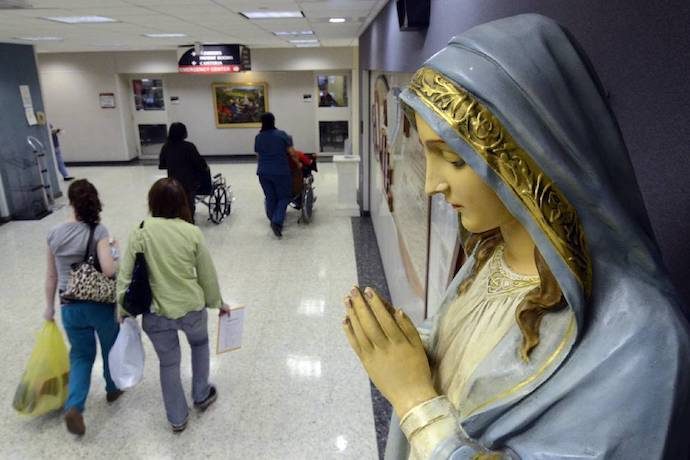The news that two major Catholic health care systems, Ascension and Providence St. Joseph Health, are considering a merger that would create a nearly 200-hospital behemoth spanning 27 states raises questions about the expanded imposition of Catholic ethical norms on the health care system in the coming year.
In addition to the Ascension-Providence merger, two other large Catholic systems, Catholic Health Initiatives and Dignity Health have finalized merger plans for a new system that would comprise 139 hospitals over 28 states.
If the Ascension-Providence merger is finalized it would create the largest health system in the United States, which means that the largest single provider of health care in the country would be under the direction of the Catholic Church and bound by the Ethical and Religious Directives for Catholic Healthcare Services. The ERDs are promulgated by the U.S. Conference of Catholic Bishops and ban, among other services, abortion, contraceptive sterilizations, contraceptives, many assisted reproduction technologies, and assisted suicide.
While the hospitals currently under the control of these systems are already bound by the ERDs, the competitive advantage gained by these mergers will allow the Catholic systems to gobble up secular hospitals and impose the ERDs on them. The number of Catholic hospitals increased by 22% between 2001 and 2016 following an earlier waver of mergers, according to a report by MergerWatch.
Market consolidation by Catholic providers will also allow these systems to dominate insurance contracts, which often results in patients being forced to choose hospitals from a single health system, which in the case of Catholic providers would not provide a full range of services, especially reproductive health care. Approximately one in six hospital beds is currently owned by or affiliated with a Catholic system, according to MergerWatch. In ten states, Catholic systems control between 30% and 40% of all acute-care beds (Alaska, Colorado, Iowa, Kentucky, Missouri, Nebraska, Oregon, South Dakota, Washington and Wisconsin).
A 2012 study found that half of OB/GYNs working at Catholic hospitals had conflicts with the institution over religiously based policies. A follow-up study found that medically indicated tubal ligations (female sterilization) were the most common source of conflict because the Catholic hospitals’ refusal to perform the procedure at the time of delivery subjected patients to the risk of a second later surgery at another facility.
Both Ascension and Dignity Health have been sued by the ACLU on behalf of patients who were refused tubal ligations at their member hospitals, including one for a woman who had a brain tumor and whose doctor had recommended the procedure because an additional pregnancy could be life-threatening.
Catholic hospitals have also refused life-saving abortions to women who are undergoing miscarriages. Many Catholic hospitals have a policy of waiting until a potentially life-threatening infection sets in before they will perform the termination of a failed pregnancy.
Large hospital systems like Ascension are also increasingly buying up physicians practices, which then brings the doctors’ offices under the purview of the ERDs. There have been reports of some doctors being told they could no longer prescribe birth control after being purchased by a Catholic system, including an Oklahoma practice owned by Ascension. For now, Ascension’s official policy appears to be that it will “tolerate” the prescription of contraceptives by individual physicians under its purview, but that could change at any time.
Catholic hospitals are also entering anther front in the culture wars by refusing to provide gender-reassignment surgery for trans individuals. According to the ERDs, in addition to specific services that are banned, a Catholic hospital should refuse to provide services “contrary to the moral teachings of the Catholic Church.” St. John’s Hospital in New Jersey refused to provide a hysterectomy to a transgender man. The Becket Fund for Religious Liberty has pursued rulings that would allow religious hospitals to evade regulations issued under the Affordable Care Act that forbid hospitals from discriminating against transgender individuals.
The Trump Administration’s broad exemption from the ACA’s contraception mandate will also allow Catholic hospitals to refuse to provide contraceptive coverage for its employees. The Catholic Health Initiatives-Dignity merger will create a system with 159,000 employees, according to Modern Healthcare. Ascension alone has 160,000 employees.
As a result of this dramatic expansion of Catholic hospitals and their market power, 2018 may be a pivotal year for new tests of “religious freedom” claims regarding the provision of health care and patient rights under both courts and an administration that are increasingly friendly to the claims of religious providers.





